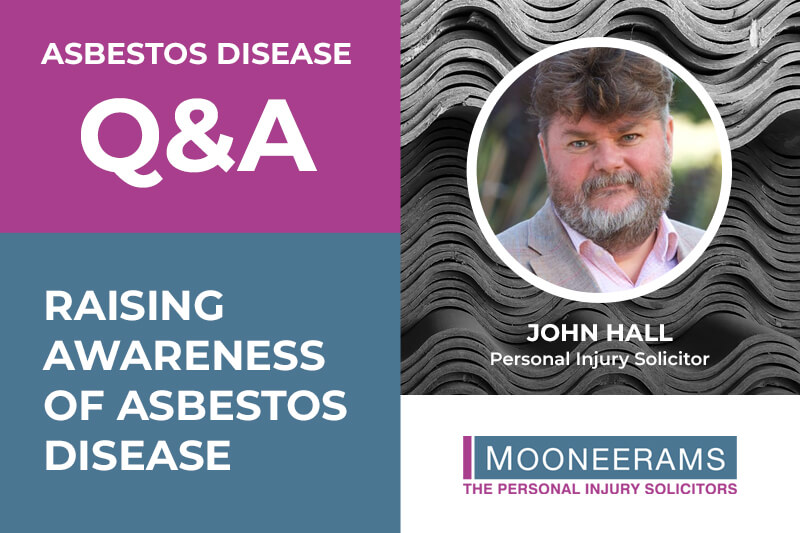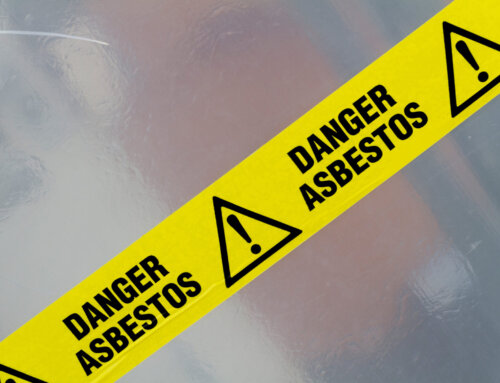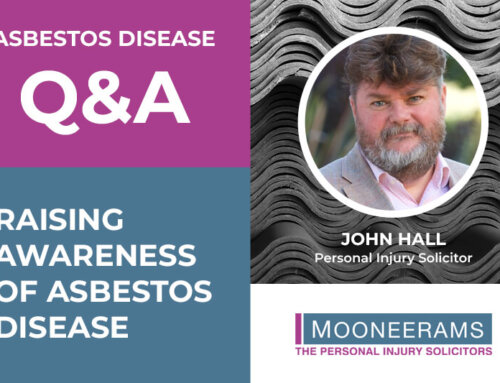This is the fourth blog from a series of seven, written flowing a Q&A session with expert asbestos disease solicitor, John Hall, who works in conjunction with us at Mooneerams. John handles asbestos disease compensation claims for our clients, and he is an acknowledged expert in this complex area of law. In this blog, John talks about, and takes our questions on, the asbestos disease called Mesothelioma and making a mesothelioma claim.
So, John, we’ve discussed, four of the five main types of asbestos disease – what is the fifth?
The final asbestos condition to talk about is Mesothelioma and it is the asbestos disease which those who are exposed to asbestos dread getting, most of all.
Mesothelioma is a tumour on the lining of the lung. Often the investigations into whether someone has mesothelioma, will start with a diagnosis of pleural plaques. Pleural plaques does not of itself lead to mesothelioma, but it is an indicator that someone has been exposed to a significant amount of asbestos.
If pleural plaques is showing up on a chest X-Ray, although it is not of itself a condition you can pursue a compensation claim for, your doctor will nevertheless be anxious about its presence in your lungs and will normally keep you under review for a period.
During this time there will normally be a succession of chest X-Rays to see if there is any change in the appearance of the pleural plaques or sometimes even for signs of pleural thickening.
Mesothelioma is a tumour on the lining of the lung, so it is easy to see why doctors look at pleural plaques and pleural thickening, because they are conditions that also affect the lining of the lung.
You can also develop mesothelioma in the peritoneum (tissue that lines the abdominal wall and covers most of the organs in the abdomen). So, any real wet surface inside the lungs that the asbestos has got through to, can be the site of a tumour. It’s generally the lungs that are affected, but less commonly, the peritoneum can be the site of mesothelioma.
If I’ve suffered asbestos exposure and assuming that I am going to get mesothelioma, how long will it take for me to be diagnosed?
Mesothelioma is a tumour that develops very late, so someone can be exposed anything between 10 and 40-50 years before being diagnosed with the disease. In other words, someone who was last exposed to asbestos 50 years ago, can still develop mesothelioma.
There are in excess of 2000 cases of mesothelioma every year in the UK. Cases are slightly on the decline but not as rapidly as had been anticipated and I think that is really to do with the way that asbestos legislation was not properly enforced until relatively recently.
Mesothelioma is a fatal condition where the patient can have anything between one and three years life expectancy upon diagnosis.
Underlying conditions can cause other problems. For instance, I have just settled a case where a client had a pre-existing heart problem. One of the newer forms of treatments for mesothelioma, immunotherapy, puts a lot of pressure on the heart and this can be generally, pretty unpleasant for the patient.
As lawyers if we have a client who has been diagnosed with mesothelioma we prioritise “living cases”. We get on with those mesothelioma claims as quickly as we can, to allow patients to ‘put their houses in order’. It may sound morbid, but as asbestos solicitors it is our duty to remain focused on doing the best we can for our client and the family they will leave behind.
Lung cancer too, is often a fatal illness, so I have the same approach for those conditions, too i.e., to try and get these types of cases dealt with as quickly and as efficiently as possible.
With cases of mesothelioma and indeed other fatal asbestos illnesses, some people might wonder what the point of getting compensation is, when you are not likely to benefit from it yourself?
From my 30 years of experience as an asbestos disease lawyer, I find that people with these sorts of condition want to sort out their financial affairs; often they have a wife and family that they are still supporting.
There are tragic cases where people are still working (and I have had a few cases like that over the years), where there may be young children who are dependent on the income that the person with asbestos disease has been bringing into the household. In those cases, we want to make sure that the family are looked after, just as much as the client.
Sometimes, we have to make difficult decisions on how we are going to look to maximise the amount of asbestos compensation they are going to get; for instance, will the claim be worth more during someone’s lifetime, or after they have passed away?
These are the difficult conversations I sometimes have with my clients. Tough as they are to deal with, normally in these situations people are amazingly matter of fact in the way they approach them; they want things to be organised for after they have gone. They know they will have money to pass on, but they want to be satisfied that everybody is well cared for.
What happens if a client dies during the course of the case?
As an example, take the case I mentioned earlier about the chap with the heart condition.
He died before we could settle the case, so the claim goes to the benefit of his wife, in this instance. The claim then became worth a little bit more because she will pursue her own claim not only for the death of her husband, but also, she can claim a bereavement award (a statutory award of personal injury compensation, payable to bereaved families) and for dependency on her late husband’s income.
In that case the chap was relatively young when he died; in his early sixties and still working, so there is a claim for his loss of earnings, but also for her dependency in the future. So, these are claims not just for the impact of the disease and the fact that somebody dies, but also for the financial consequences of the illness.
Fundamentally what we are trying to do is put the victim, or the victim’s family in the position they would have been in had their loved one not developed this illness.
Accordingly, if someone suffers from an illness that causes their premature death, then there are lots of potential claims; loss of earnings, the fact they there is nobody that looks after the garden, DIY – all sorts of things you would probably not normally think about, such as the stuff that you do day to day and the help you might need, after someone has died. All of these become a list of things that you have effectively lost.
In the fifth asbestos-related blog in this series of seven, John Hall answers a variety of questions including why people still get asbestos disease, whether you can still get any of the asbestos diseases, when the final ban on asbestos came into force and more.
If you are worried that you may have been exposed to asbestos, because of the kind of work you used to do, call us in confidence on 029 2199 1927 and we’ll get John to call you back to have a no obligation chat with you.
Read more in our Asbestos Disease Q&A series:
Posted in Asbestos Disease




